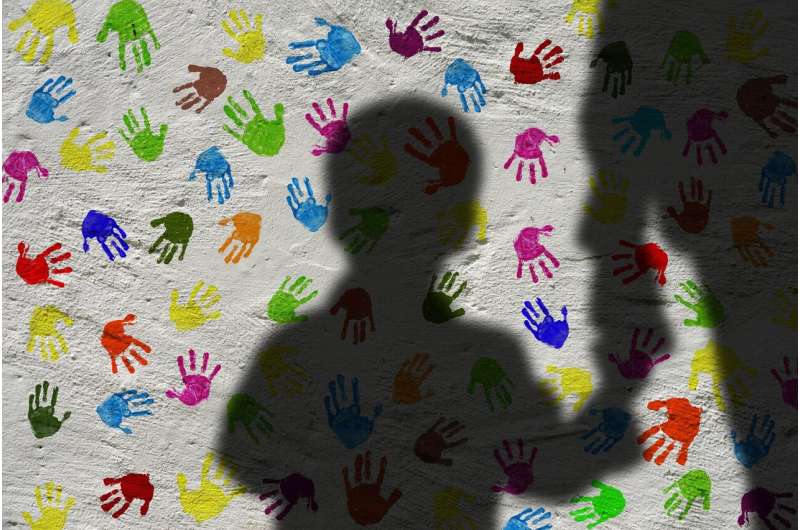This article has been reviewed according to Science X's editorial process and policies. Editors have highlighted the following attributes while ensuring the content's credibility:
fact-checked
trusted source
written by researcher(s)
proofread
People who experience childhood sexual abuse tell us it affects their entire life—and research backs them up

When survivors of childhood sexual abuse tell their own stories in court or through government inquiries, they often describe the pervasive personal impact across many aspects of their life. In the words of one survivor, "in every way, it had a negative impact."
A long history of research aligns with these personal reflections. It shows survivors are more likely to have long-term difficulties with their mental and physical health in adulthood.
There has been a lot of research on the long-term impacts of childhood sexual abuse, but most of it focuses only on one aspect (usually mental health) and one point in a person's life. But we know from survivors and their families that the consequences can emerge in many different aspects and at different stages of life.
Based on information drawn from the long-running Dunedin Study, which has followed the lives of around 1,000 people since they were born in the early 1970s, our research confirms the long-term consequences of childhood sexual abuse and the lifelong challenges survivors might face.
Understanding the impacts
To better understand the long-term impacts of childhood sexual abuse, we wanted to investigate survivors' experiences across a long period of time, from young adulthood to middle age.
We also wanted to find out whether people who had experienced childhood sexual abuse were more likely to have persistent difficulties across adulthood in multiple life domains, including physical health, mental health, sexual health, interpersonal relationships, economic well-being and antisocial behavior.
To answer these questions, we used information collected up to the Dunedin Study's latest assessment in 2017-18. At this point, study members were 45 years old. Over their lifetimes, they and their parents have contributed a wealth of information, including about their health, wealth and well-being, as well as data from government records and results from physical, cognitive and oral health tests.
To find out about experiences of childhood sexual abuse, we asked study members when they were young adults a series of questions about unwanted sexual contact before age 16.
Around 30% of females and 9% of males reported experiencing unwanted sexual contact of any type before age 16, while 10% of females and 2% of males reported severe forms of childhood sexual abuse. These figures may seem high, but they are not unique to our study. They align with those seen in other New Zealand population-based research with people of the same generation.
By repeatedly measuring outcomes in multiple life domains and across adulthood (at ages 26, 32, 38 and 45), we were able to see whether people who reported experiencing childhood sexual abuse were at increased risk for long-term difficulties.
Life-long and pervasive consequences
After adjusting for other major life stressors such as child poverty, other types of abuse and neglect, serious household dysfunction and sexual assault in adulthood, we found survivors were 1.5-2 times more likely than their peers to experience persistent difficulties. This included smoking and alcohol consumption, high systemic inflammation, poor oral health, poor mental health, sexually transmitted diseases, high-conflict relationships, financial difficulties and high levels of antisocial behavior.
Survivors were also 2.5-4 times more likely to have attempted suicide, with the highest risk among those who experienced more severe abuse.
There are many reasons why people who experience childhood sexual abuse are more likely to go on to have long-term difficulties across many different aspects of their lives.
These reasons range from the long-term impact of chronic stress on the body and brain to interpersonal difficulties arising in part from a learned lack of trust in others. People who experience childhood sexual abuse are also more likely to have had other major early-life challenges, including growing up in very dysfunctional households and in poverty.
Prevention and healing
There is no single factor that explains survivors' increased risk for long-term difficulties. In our study, using the comprehensive information collected over study members' lifetimes, we were able to look at the long-term consequences of childhood sexual abuse separately from the consequences associated with other major life stressors.
Preventing childhood sexual abuse in the first place is of course the best way forward.
The next best thing is to recognize the cumulative, long-term impact such abuse can have and to invest in early interventions to help survivors as much and as quickly as possible. When thinking about treatment and support for survivors as they get older, our research shows it is important to consider well-being broadly, not just mental health.
It is important to remember a person's path is not set in stone. On average, the chances of having persistent difficulties across multiple life domains increases with abuse severity, but not all survivors experienced those long-term difficulties. People who get the right treatment and support are the most likely to go on to live their best lives.
This article is republished from The Conversation under a Creative Commons license. Read the original article.![]()


















